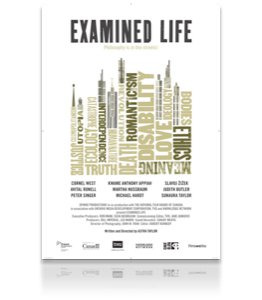
EXAMINED LIFE
(US, 2008, d. Astra Taylor)
A film on philosophy – based on the Socratic premiss that the unexamined life is not worth living.
Not exactly the topic one expects to find for a film but Canadian writer-director, Astra Taylor, is both philosopher and film-maker and decided to interview some of the intellectuals who have had an influence on her, giving them ten minutes each to answer questions she poses and to develop their answers according to their particular approaches and offer insights and practical dimensions to their thought.
She had come across a book about the nature and effects of walks (Wanderlust by Rebecca Solnit), so she invited her guests to travel and, principally, walk. This offers them an opportunity to philosophise outdoors, in the fresh air rather than in an academic context. It is interesting to observe their body language as well as listen to them, to observe what they wear (generally simple and unassuming) and to discern the passion and intensity of their views and their convictions in putting them forward. This means that the film is more cinematic than might have been expected. There are talking heads, certainly, but also action and variety of locations to keep the audience attentive rather than simply listening to lectures. In a Greek tradition, they are philosophers in the marketplace like Socrates, and Peripatetics.
This is Astra Taylor's list of speakers with some indication of their concerns as well as where they were when they were interviewed.
Cornel West, who has become something of a media celebrity (and an advisor to the Obama campaign, though the film was made while George Bush was still president). West is interviewed in a taxi travelling through Manhattan. He questions the concept of aiming for wholeness. Rather, we have built on disasters and life can never be complete or whole. This is a romanticism of which he is very critical.
Avital Ronell walks in a New York square, with curious onlookers, upset that she is limited to ten minutes and questioning the meaning of a search for meaning.
Peter Singer is in New York's 5th Avenue, in crowds on the street outside the fashionable shops questioning people's choices between saving a child from drowning in a pond and ruining their good shoes but their unwillingness to send the price of a fashionable pair of shoes to a charity. His description of ethics is very other-focused, a secular nobility of human nature.
Kwame Anthony, cultural theorist, seen with luggage moving through Toronto airport looks at respect for differing traditions and not placing one over the other. He is from Ghana with a British parent as well – and comments about the role of the father as provider and protector in western custom whereas it is the mother's brother, the uncle (and he has six nephews and nieces) who has the family responsibility. Is one better than the other?
Michael Hardt is rowing a boat in a park pond speaking about anarchy and revolution.
Martha Nussbaum is more engaging to listen to as she walks, presenting insights into capacities and capabilities as a way of showing potential for ethics and politics.
Slavoj Zizek, from Slovenia, has had films made about him and has hosted a documentary The Perver's Guide to Cinema. He is not bashful and does not hesitate with his views. With a council worker's jacket on, he talks from huge garbage dumps and urges humans to become more artificial, because that is how the world has developed, rather than hankering after an idealised, impossible world.
Judith Butler is a Berkely feminist and gender philosopher who takes a walk with Sunaura Taylor, who has opted to live in San Francisco as the most disabled friendly city, the director's sister, who is wheelchair bound because of a muscular and bone disability but who is an articular thinker and an artist. They discuss social space, expectations of what is 'normal' behaviour and reaction – and illustrate their points by buying and fitting on a pullover in a store as well as a sad story of a boy who swished when he walked and who was thrown from a bridge and killed by school students , questioning how a murderous intent could result from reaction to a way a boy walked.
There is no dialogue between the 'cerebral celebrities' themselves. Rather, this is a brief showcase for some contemporary thinkers to stimulate a willing audience.